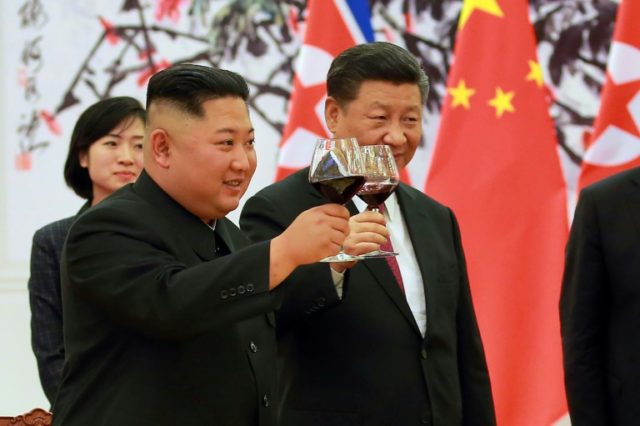Chinese Communist Party leader Xi Jinping held an audience with North Korean Foreign Minister Ri Yong Ho in Beijing on Friday to discuss how China could most easily facilitate friendly relations between the two nations, and help North Korea elevate its status internationally.
Xi celebrated a “new chapter” opening between the two communist nations and vowed to help “support the amelioration of inter-Korean relations and facilitate reconciliation and cooperation between the two sides,” according to Chinese state media outlet Xinhua. He also asserted that inter-Korean relations were “back to the right track of political settlement” and applauded North Korea for its efforts in reconciling with the South.
Ri’s visit to Beijing follows shortly after Xi met personally with U.S. President Donald Trump at the G-20 summit in Buenos Aires, Argentina, where it is believed they discussed tensions on the Korean peninsula. It also follows talk from Seoul that leftist President Moon Jae-in would like dictator Kim Jong-un to visit the South Korean capital before the end of the year.
Diplomatic discussions with Kim have long been predicated on North Korea making conscious efforts to dismantle its illegal nuclear weapons program. While the Kim regime has not tested any nuclear weapons since 2017, various reports using satellite images of North Korean military sites suggest that the dictatorship continues to invest heavily in weapons technology that could be used to attack South Korea, Japan, or the United States.
North Korea remains under one of history’s most stringent international sanctions regimes, which China has signed onto through the U.N. but encouraged an end to in the recent future.
The Xinhua report does not mention Xi making any overt statements regarding the North Korean military or the sanctions, instead issuing unspecific remarks about supporting North Korea’s will to find “a development path suited to its national conditions under the leadership of Kim.”
Ri, Xinhua adds, insisted that the Kim regime is “committed to denuclearization” on the entire Korean peninsula – a phrase the North has used in the past to mean the removal of U.S. troops – and is “ready to keep close communication and coordination with China over peace and stability on the Peninsula and in the region.”
The Chinese Foreign Ministry offered more details about Ri’s remarks during another discussion with Chinese Foreign Minister Wang Yi.
“Foreign Minister Ri Yong-ho also said that the DPRK [North Korea] sticks to the position of realizing the denuclearization of the Peninsula and upholding peace and stability on the Peninsula,” spokesman Geng Shuang told reporters at the Ministry’s regular press briefing. “He hopes that the DPRK and the U.S. can establish necessary mutual trust and earnestly meet each other halfway.”
Geng quoted Wang as celebrating the “momentum for detente” in Korea.
“China hopes that the DPRK and the US can maintain dialogue, address each other’s concerns in a balanced way and achieve the goals set in the DPRK-US joint statement,” Geng said. “China also supports the DPRK and the ROK in enhancing exchanges and interactions and advancing reconciliation and cooperation.”
Ri arrived in China Thursday for a trip expected to last four days, according to China’s Global Times. While Chinese officials offered little clarity regarding the specific advice Beijing has offered Pyongyang regarding denuclearization and talks with the United States, the Global Times, typically a reliable barometer of Chinese government opinion, cited “experts” Thursday who insisted that North Korea still “needs to hear China’s advice” to properly navigate relations with the United States.
“China and the US share common interests on the denuclearization of the peninsula, and even if China-US ties were intense a few months ago, cooperation and communications over the peninsula issue have never stopped,” Wang Junsheng of the East Asian Studies at the Chinese Academy of Social Sciences told the newspaper.

COMMENTS
Please let us know if you're having issues with commenting.